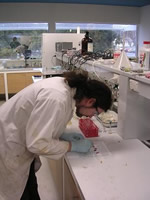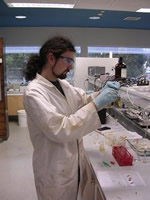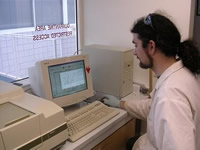|
Where did you grow up and go to school?
I moved around a fair bit when I was younger, and started kindergarten at Woodbridge on the d'Entrecasteaux. After that we moved to the mainland, and I did some prep in Melbourne and Perth before taking years 1 through 3 over the radio thanks to Kalgoorlie School of the Air (living at Forrest, on the Nullarbor). I moved back to Tassie and stayed there afterwards, finishing primary at Cressy District High School, high school at Prospect and college at L.C.
What inspired you to do science?
 All the moving around meant I had the chance to see a wide variety of things and live in a fair range of climates before I was old enough to really understand what was going on, and that has no doubt played a part in fostering any curiosity. The main influence for science has no doubt been my parents though; they met while studying Zoology (at UTas!), and while they didn't end up in scientific careers, they never let go of what they learnt. So the attitude in the home has been a huge part in me undertaking science. Curiosity would be the other main factor - I've always been interested in 'how things work', but the invisible and miniscule has been the most interesting, especially when it affects the world we live in strongly, unusually or spectacularly.
All the moving around meant I had the chance to see a wide variety of things and live in a fair range of climates before I was old enough to really understand what was going on, and that has no doubt played a part in fostering any curiosity. The main influence for science has no doubt been my parents though; they met while studying Zoology (at UTas!), and while they didn't end up in scientific careers, they never let go of what they learnt. So the attitude in the home has been a huge part in me undertaking science. Curiosity would be the other main factor - I've always been interested in 'how things work', but the invisible and miniscule has been the most interesting, especially when it affects the world we live in strongly, unusually or spectacularly.
What did you study as an undergraduate at university?
I studied Chemistry and Genetics at university. I spread my selection around a bit to include some Zoology and Human Biology - and I really regret not taking any physics. The genetics was undertaken as a major in Botany, and is still one of my main interests as it will no doubt lead to some very interesting things in the (near) future. Chemistry always struck a certain chord with me though, and helped me understand so much about the world I became hooked. After I had finished my undergraduate degree I moved back north and studied pesticide sampling techniques for honours in Launceston, and am now doing my PhD there as well.
What's your PhD research involve?
 My PhD is in the field of environmental chemistry which has a lot of 'real world' tie-ins, especially in Tassie where it can be very topical. The project I'm working on is to develop a metal sampling technique called DGT (Diffusive Gradients in Thin films) to a point where it can pick individual metal 'species' (such as cadmium or copper or zinc) out of the soil and change color depending on which metal it has picked up. This is being done as part of a grant from the Antarctic Division and the samplers will be deployed in several Antarctic bays, some of which may have suffered metal poisoning from past rubbish dumps. I stated in March this year, and should be finished in early 2009 (hmm, never looked at it that way before�). After I'm done, I'm not sure what I want to do. I would like to travel some more and if I had the opportunity to work overseas I would most likely take that.
My PhD is in the field of environmental chemistry which has a lot of 'real world' tie-ins, especially in Tassie where it can be very topical. The project I'm working on is to develop a metal sampling technique called DGT (Diffusive Gradients in Thin films) to a point where it can pick individual metal 'species' (such as cadmium or copper or zinc) out of the soil and change color depending on which metal it has picked up. This is being done as part of a grant from the Antarctic Division and the samplers will be deployed in several Antarctic bays, some of which may have suffered metal poisoning from past rubbish dumps. I stated in March this year, and should be finished in early 2009 (hmm, never looked at it that way before�). After I'm done, I'm not sure what I want to do. I would like to travel some more and if I had the opportunity to work overseas I would most likely take that.
What do you love about science?
That's one of the things that appeals to me about science, it applies everywhere. Culture, politics and many other things that define humanity can be limited to localities, and are almost always limited to areas of human population, but science is simply trying to understand everything, from places we have never gone and may never go, to things we take for granted. This broad scope combined with the basic laws and pattern repetition seen throughout the world means that anyone can find some of interested in any place. The applications to our everyday lives are really just a happy coincidence.

|
|
